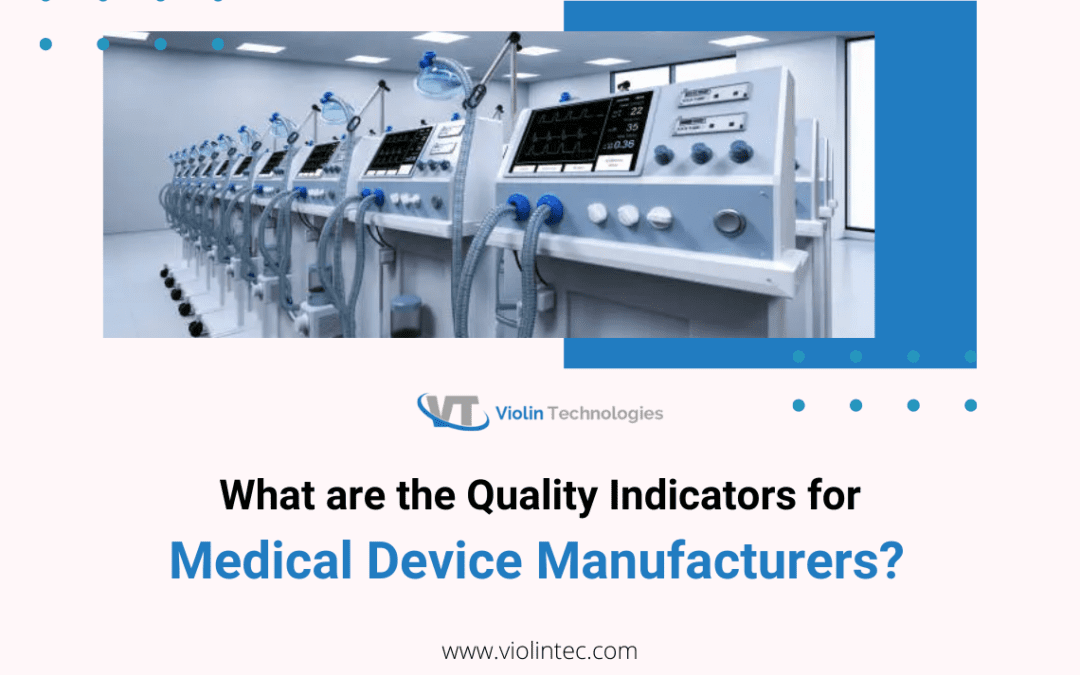The medical device manufacturers industry has doubled in recent years but was outpaced by medical accidents and malpractice. Therefore, it becomes essential for medical device manufacturers to perform rigorous quality testing at every step of the production process, especially when outsourcing some manufacturing processes.
Quality Indicators for Medical Device Manufacturers
The company’s commitment to quality management matters greatly regarding medical device manufacturing. They must always be thriving for excellence. It is not the responsibility of just one department but the company, from Top-level management to individual employees or operators managing the production processes.
1.Measuring KPIs (Key Performance Indicators):
Key performance indicators or KPIs help gain better insights and calculate business performance. Five vital KPIs are:
-
Medical device reporting (MDR):
Automating MDR reporting and tracking product quality are important for complying with the quality standards of the medical devices manufacturing industry.
-
Complaints Resolution:
How quickly medical device contract manufacturers can address and resolve the complaints? Are they addressed properly? The obtained information from the complaints and issues should be used to improve product quality. The number of open complaints, the average time of the open status of complaints, and the number of overdue complaints are some of the metrics that should be monitored.
-
QMS (Quality Management system)
It helps identify the root cause of problems quickly and communicates them to the organization. It is critical for continuous improvement in manufacturing processes and optimizing overall equipment effectiveness (OEE).
-
Corrective action:
Automated corrective and preventive action (CAPA) management is one of the best strategies for the quality management system. It reduces audit time, mitigates risks, identifies sources of actual or potential issues, improves product quality and safety, increases customer success, and helps to ensure compliance with global quality standards.
-
Audit findings:
It helps in knowing the effectiveness of internal and external audits.
2.In House Expertise in Design, Engineering & Production:
Outsourcing certain manufacturing processes can affect the quality of components as they may not have the same level of commitment towards quality standards as your company. Therefore, good medical device manufacturers maintain them in-house. They understand and apply the best practices used in the medical devices contract manufacturing industry to prove their expertise.
3.Quality control of Production processes:
All medical device manufacturers must choose their precision metal sheet stamping manufacturers that understand and stick to the medical industry’s strict quality standards and tooling parameters. Also, they should have processes and technologies put in place to monitor the production quality standards and resolve the problem if it arises.

4.Adherence to Global and Industrial Quality Standards:
Medical devices contract manufacturing industry is one of the highest regulated industries in the world, with strict ISO standards for OEMs (Original equipment manufacturers) and their suppliers. Two quality standards are given the prime importance in the medical manufacturing industry:
-
ISO 13485:2003:
It emphasizes quality, design manufacturing processes, and reliability. This is the additional, optional standard for other precision metal sheet stamping manufacturers but is critical for those who manufacture components of medical devices.
-
ISO 9001:2015:
This is the basic, minimum quality standard for all precision metal sheet stamping manufacturers. It encourages the manufacturers to record and document everything in the quality management system. It also helps in determining whether the product has been compliant or not. It also expects companies to adapt to changing industry quality standards continuously.
5.Prevention of Manufacturing Defects:
Company should be focused on continuous improvements to prevent manufacturing defects. Medical device contract manufacturers should maintain high-quality standards with the least manufacturing defects to comply with necessary improvement procedures.
6.Careful Evaluation of Supply Chain:
Managing the global supply chain can be quite a hectic and overwhelming task. Therefore, Original equipment manufacturers must carefully filter and select the best suppliers in their respective fields. They must also evaluate regularly to ensure maintenance of the highest quality standards.
7.Industrial Quality Training:
Regular employees and workers should have the same level of commitment towards maintaining quality standards as top-class executives. A medical device manufacturing company must have regular comprehensive training programs for their managers and workers. It helps them align with the company’s goals towards quality as a priority and shared responsibility of every employee.
In conclusion
Summing it up, quality is very crucial when it comes to medical device contract manufacturing. It opens up new opportunities for your business. It has a measurable impact on different aspects of your company, including lower costs, increased product turnaround speed, higher overall quality, increased and improved tracking and compliance, a time feedback loop, and increased customer satisfaction.

